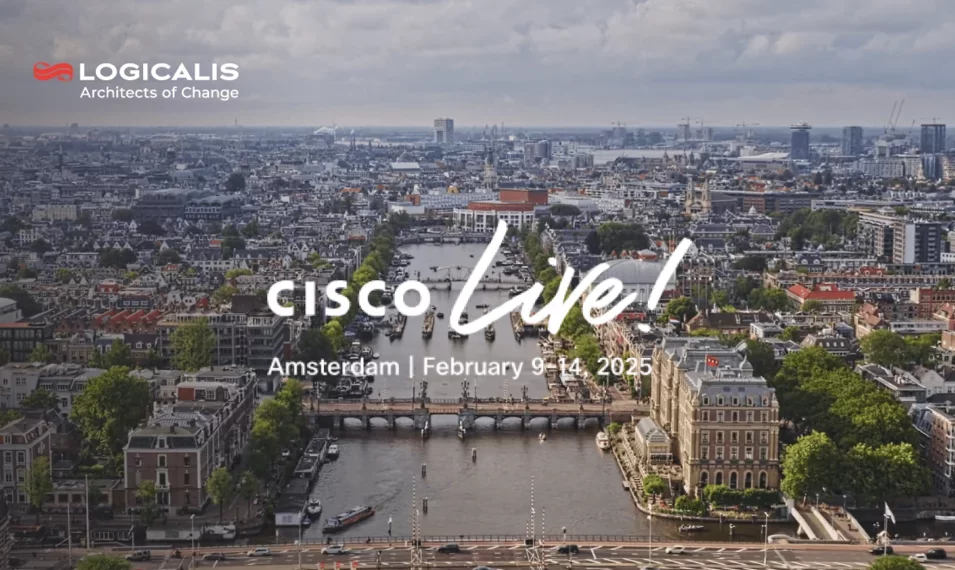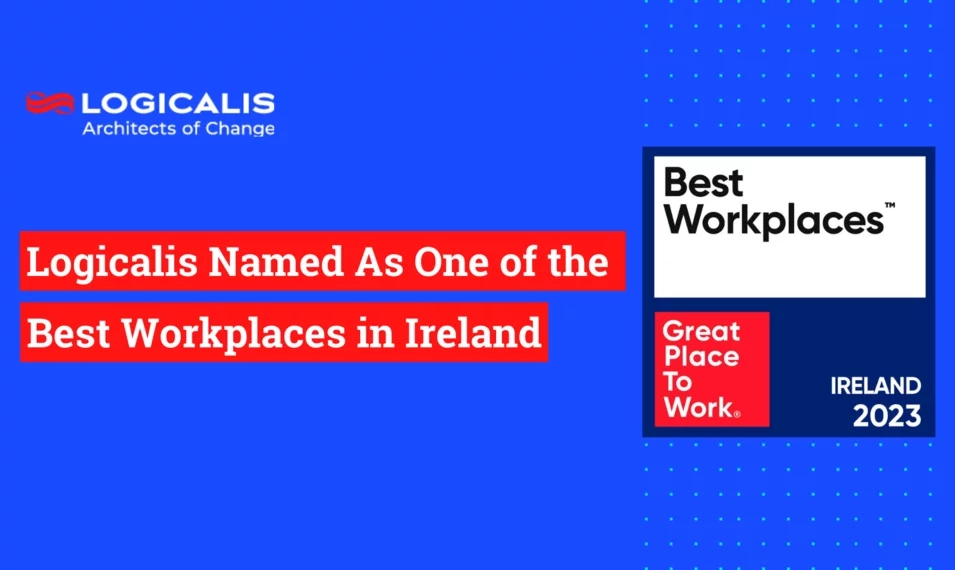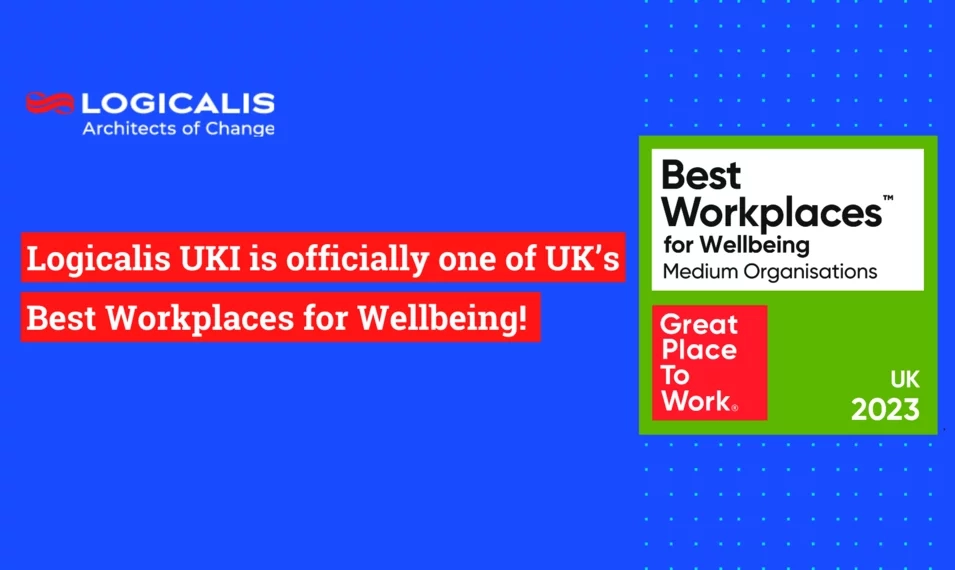, Jan 13, 2021
By Justin Kearney, Logicalis SVP Human Resources
Remote working had already begun to become more mainstream in recent years. However, no one could have predicted the impact of the pandemic on the future remote working. According to recent US technology research, globally the number of employees permanently working remotely is set to double in 2021 from 16.4% to 34.4% In fact, a report from Cardiff University and the University of Southampton showed that 88% of employees who worked at home during lockdown would like to continue in some capacity even once restrictions lift.
Remote working is here to stay, and employees have learnt how to stay productive and proactive. However, the sudden transition to working from home has not been an easy one.
While businesses overcame technical and administrative challenges quite quickly, the unexpected shift to remote working is taking its toll on mental health for employees. Whilst many enjoyed the novelty of working remotely early in the pandemic, a significant number of workers have suffered from isolation. Spending prolonged periods of time in the same environment during one of the most challenging and uncertain times of our generation is difficult. To combat the negative mental health implications, organisations and business leaders have had to step up and consider the wider aspects of keeping employees engaged, motivated and positive.
Focus on wellbeing
Most employees were not used to working from home full-time before lockdown. In-person meetings were changed to video or phone calls, and to keep teams in touch, collaboration platforms were implemented. The adoption of these tools enabled workforces to work effectively and deliver the same level of service that they would if they were working from the office, continuing to create innovative solutions.
However, these same collaboration tools can exhaust employees. Being on a video call requires more focus than a face-to-face meeting. We are constantly having to process non-verbal cues like facial expressions, tone of voice, pitch and body language and many of us are on several video calls a day.
Lockdown has its own set of challenges for employers. Summer lockdowns were tough enough for employees, but cold and dark winter days are further affecting employee wellbeing. Many business leaders have been charged with creating initiatives to connect with employees, encourage teamwork and digitally replicate the collaborative culture of the office. Virtual cocktail hours, bring your pets to virtual work meetings and Logicalis’ Global Innovation Challenge, are just some of the ways we have been engaging with our global colleagues, beyond their day-to-day responsibilities to ensure our teams feel connected and supported.
Constant communication
Business leaders must be constantly communicating with all employees to keep them motivated and engaged. You cannot communicate enough, especially with so much uncertainty about the future.
At Logicalis, we have been sending out regular communications to team leaders and employees around the world to keep them engaged, optimistic, and positive about the future. In fact, last year our US CEO was reading bedtime stories to employees’ children via Zoom, while Group HR were sharing weekly wellbeing initiatives across the group and our CFO kept everyone aware on Logicalis’ trading performance. These varied communication methods meant our employees were fully informed and motivated, allowing them to continue to provide best in class service to our customers.
How leaders communicate can make or break employee commitment to their organisation. When people are exposed to bad news and negativity, largely within circumstances beyond their control, leaders need to remember to highlight the positives. Reassuring your employees and reiterating your support will ensure your employees feel safe through the unpredictability. The more committed you are to your employees, the more committed they will be in return.
Preparing for the future
Given these extraordinary circumstances it isn’t surprising that employees are anxious about the future and they are looking to leaders for cues. People need leaders who can help them navigate uncertainty through a commitment to well-being and mental health, constant communication and preparation for the future. Sharing upcoming plans and strategy, alongside what is going well for the organisation helps bring employees along the journey and alleviate their concerns.
Moving forward, businesses must remember that despite the circumstances and the pressure on mental health, employees have demonstrated agility and adaptability to help support business continuity.
Employees deserve company support as they helped drive businesses forward through a trying year. They have been under immense strain so now is the time for businesses to practice empathetic leadership and take a more humanistic approach. What leaders say, how they convey it, and the commitment they make to employees will directly correlate to their success during, and beyond the pandemic.
Related Insights

United Kingdom , Feb 11, 2026
Press Release
Logicalis achieves Cisco Preferred Partner status across all architectures
Logicalis UK&I is proud to announce its recognition as a Cisco Preferred Partner across all five Cisco technology architectures - Networking, Security, Collaboration, Services, and Cloud & AI Infrastructure - under the newly launched Cisco 360 Partner Program.

United Kingdom , Jan 6, 2026
Press Release
Logicalis named as supplier on CCS's new Technology Services 4 framework
Logicalis UK&I, a leading global technology services provider and trusted partner to the UK public sector, is excited to announce being named as a supplier on Crown Commercial Service's (CCS) RM6190 Technology Services 4 Framework.

United Kingdom , Dec 16, 2025
IBM acquires Confluent: What it means for the industry and for customers
IBM’s acquisition of Confluent for approximately $11 billion marks a significant development in data streaming and AI-driven enterprise innovation.

United Kingdom , Oct 29, 2025
Press Release
Logicalis named as supplier on NHS Shared Business Services Digital Workplace Solutions 2 Framework
Logicalis UK&I has been named a supplier on the NHS Shared Business Services Digital Workplace Solutions 2 Framework, enhancing its role in supporting NHS Trusts and public sector organisations with digital transformation.

United Kingdom , Oct 28, 2025
Press Release
Logicalis achieves major sustainability milestones and expands global community impact
Logicalis has announced significant progress in its FY25 Responsible Business Report, demonstrating measurable impact through strategic environmental, social, and community initiatives.

United Kingdom , Jul 9, 2025
Press Release
Logicalis recognised as NetApp Public Sector Partner of the Year
Logicalis, a leading global technology service provider, has been recognised as Public Sector Partner of the Year at the prestigious 2025 UKI NetApp Partner Awards.

Ireland , Jun 26, 2025
Press Release
Logicalis sets foundation for John Paul Construction's international future with AI services
Logicalis UK&I, a global technology service provider, today announces that it has set the foundation for John Paul Construction’s international future with AI services.

United Kingdom , Jun 26, 2025
Press Release
Logicalis reaches carbon-neutral milestone on its journey to Net Zero
Logicalis, the leading global technology service provider, today announces it has achieved its 2025 target for carbon neutrality in Scope 1 and 2 emissions - marking a significant milestone in the company’s journey to reach its SBTi-validated goals.

United Kingdom , May 27, 2025
Press Release
Logicalis becomes first Cisco XDR CPS Specialisation Partner to offer global Cisco MXDR
Logicalis, the leading global technology service provider, today announces it has achieved the Cisco Extended Detection Response (XDR) Cisco Powered Services (CPS) Solution Specialisation and becomes a Cisco XDR CPS Specialisation Partner.

United Kingdom , Mar 24, 2025
Proud to announce: Logicalis wins the 5G Ecosystem System Excellence Award!
Logicalis is delighted to be recognised as part of the winning team for the prestigious 5G Ecosystem System Excellence Award through the Department for Science, Innovation and Technology for Science Innovation DSIT Future Networks Programme.

United Kingdom , Mar 11, 2025
Logicalis 2025 CIO Report: CIOs under pressure to deliver a return on innovation
17 March 2025. Logicalis, the leading global technology service provider, has released its annual CIO Report, which reveals that 95% of organisations are actively investing in technology to create new revenue streams within the next 12 months.

United Kingdom , Feb 26, 2025
Blog
Behind the delegate pass of Cisco Live 2025
Let me take you behind the scenes of what was an incredible week at Cisco Live Amsterdam 2025. As someone who was there on the ground, I wanted to share the innovations that got everyone talking – and more importantly, what they mean for your business.

United Kingdom , Dec 4, 2024
Microsoft Ignite 2024: Copilot innovation and advancements in security
The major announcements highlighted this year focused on Copilot and Security. While this may not come as a surprise, everyone should be excited about what these advancements mean for the upcoming year.

Ireland , May 24, 2024
Press Release
Logicalis’ Gareth Grimshaw named IT Architect of the Year at the 2024 Tech Excellence Awards
Dublin, 24th May 2024 – Logicalis UK & Ireland (UK&I), the IT solutions and managed service provider, today announces that its Senior Azure Architect Gareth Grimshaw was named IT Architect of the Year at the 2024 Tech Excellence Awards.

United Kingdom , Jan 17, 2024
Latest EOX Announcements from Cisco
EOX is a critical milestone when looking at the lifecycle of your Cisco environment. Logicalis have compiled the latest Cisco announcements into an easy-to-navigate report that allows you to obtain end-of-life information including the latest End of Sale announcements and all products which are going End of Life, End of Attach and End of Security Vulnerability.

United Kingdom , Nov 13, 2023
Logicalis named inaugural 2023 Cisco Global Sustainability Partner of the Year
Last week, we were honoured to receive the inaugural 2023 Cisco Global Sustainability Partner of the Year award during Cisco's Global Partner Summit event in Miami. This prestigious accolade acknowledges Logicalis' exceptional sustainability achievements and success in helping customers reduce the environmental impact of their digital ecosystems across the globe.

United Kingdom , Sep 22, 2023
Cisco Prime Reaches End of Life (EOL): What's Next?
In the world of networking, Cisco Prime Infrastructure has been an essential tool for many professionals. On March 31 2023, Cisco announced the End of Life (EOL) for Cisco Prime. Now is the time to start your migration to ensure a seamless transition to the new platform.

United Kingdom , Aug 10, 2023
Logicalis named as NetApp Prestige Partner
As a global technology service provider, Logicalis UKI has been recognised with NetApp Prestige Partner status under the new partner programme, NetApp Partner Sphere. This achievement recognises sustained excellence in the design and delivery of NetApp technologies, and further strengthens our position as a leading provider of NetApp solutions and services.

United Kingdom , Jun 21, 2023
Logicalis UK&I Named FlexPod Partner of the Year during NetApp UK&I Partner Awards, London, May 2023
Logicalis UKI is proud to announce it has been awarded the 2023 NetApp UK&I Partner Award for FlexPod Partner of the Year. In front of 150 industry peers this distinguished partner industry recognition was presented during an Awards Dinner at ‘Frameless’, Marble Arch, London.

United Kingdom , Jun 21, 2023
Logicalis WINS at the UK Storage Awards 2023!
Alex Louth, Managing Director, Logicalis UK&I, won the ‘Contribution to Industry’ award and Logicalis UK&I were named ‘Corporate Reseller of the Year’ at the UK Storage Awards 2023. At the awards ceremony held in London on June 8th, an audience of over 350 industry professionals was present to witness the announcement as Logicalis was revealed as a multiple award winner.

United Kingdom , May 30, 2023
Logicalis WINS at the UK Network Computing Awards 2023!
Logicalis is delighted to announce that we have been awarded ‘UK Network Project of the Year’ in collaboration with Birmingham City University at the UK Network Computing Awards, May 2023.

United Kingdom , Feb 22, 2023
Logicalis Named As One of the Best Workplaces in Ireland
Logicalis is delighted to announce that it has been officially recognised as one of the Best Workplaces in Ireland in 2023. Logicalis was recognised at the annual Great Place to Work Awards on Wednesday 22nd February 2023. This is Logicalis' first year to be named as a top Irish workplace, which is based on direct feedback from employees, provided as part of an extensive and anonymous survey about the workplace experience. This was a notable year for the Best Workplaces Awards, as it is the first time that 100 companies were recognised.

United Kingdom , Feb 15, 2023
Bold leadership elevates CIOs to the boardroom, according to Logicalis global study
CIOs have stepped into the role of digital evangelist and strategic advisor, according to the 2023 Global CIO Survey from Logicalis, a global technology service provider. The study questioned 1000 technology leaders and explores how the role of the CIO is evolving. This year’s survey, The Meteoric Rise of the CIO, demonstrates a monumental shift in the role of the CIO from tech implementor to business leader.

United Kingdom , Feb 14, 2023
Press Release
Logicalis UKI is officially one of UK’s Best Workplaces for Wellbeing!
London, 14th February 2023 – Logicalis UKI has officially been named one of the UK’s Best Workplaces™ for Wellbeing (2023) by Great Place to Work®, the global authority on workplace culture.

United Kingdom , Dec 19, 2022
Press Release
Logicalis commits to Corporate Net Zero Standard (SBTi), marking another milestone in its sustainability journey
London, United Kingdom – 19 December 2022: Logicalis, a global technology service provider, today announces its commitment to the Science Based Targets initiative (SBTi) Corporate Net Zero Standard - the world's first framework for corporate net zero target setting in line with climate science.

United Kingdom , Nov 17, 2022
Navigating the world of Microsoft Licencing
Insights into what licencing options are available and what might be the option to consider for your organisation based on some recent announcements by Microsoft.

United Kingdom , Nov 16, 2022
Logicalis achieves the Cisco Powered validated service for Secure Access Service Edge (SASE) and SD-WAN status
This status means Logicalis is the only global gold partner who can deliver a managed SASE service to customers anywhere in the world!

United Kingdom , Nov 16, 2022
Announcing End of General Support for VMware vSphere 6.5 and vSphere 6.7
Upgrade today to maintain support and subscription services Article by Gareth Headley, VCIX – DCV, vExpert, VMware Infrastructure Specialist at Q Associates, a Logicalis company.

United Kingdom , Nov 8, 2022
Maximise your IT budget with exclusive IBM Academic Price Promotions offered by Logicalis
In partnership with IBM, Logicalis is delighted to announce a series of academic price promotions, covering a range of IBM rack servers and storage systems.

United Kingdom , Nov 7, 2022
Logicalis Recognised as Winner of the Cisco Global Enterprise Networking and Meraki Partner of the Year Award at Cisco Partner Summit 2022
Logicalis UKI is proud to announce it has been recognised as the Global Enterprise Networking and Meraki Partner of the Year at Cisco’s annual Partner Summit. As one of only six Cisco Global Gold Certified Partners, Logicalis is honoured to receive this award for demonstrating innovation, driving engagement, and delivering greater value for its customers and communities.

United Kingdom , Nov 3, 2022
Logicalis UK&I commits to being carbon-neutral by 2025 as part of Techies Go Green movement

United Kingdom , Oct 24, 2022
Discover what was unveiled at Microsoft Ignite 2022
Top Announcements in Microsoft Hybrid Cloud and Security.

United Kingdom , Sep 28, 2022
Logicalis UK&I officially named a 2022 UK’s Best Workplace™ in Tech
Logicalis UK&I, an IT solutions and managed service provider, today announces it has been recognised as one of the UK's Best Workplaces™ in Tech, 2022. The list was launched this morning by Great Place to Work® UK, ranking Logicalis UK&I 59 out of 67 medium-sized organisations.

United Kingdom , Sep 22, 2022
Logicalis UK named supplier on G-Cloud 13 Framework
Logicalis UK, an international IT solutions and managed services provider, has been listed as a supplier on the G-Cloud 13 Cloud Services and Solutions Framework.

United Kingdom , Aug 8, 2022
Logicalis Acquires Q Associates to extend specialist Microsoft and data-centric IT services capabilities across their UK&I operation
Logicalis, an international IT solutions and managed services provider, today announced it has acquired Q Associates, one of the UK's leading providers of IT consultancy and advisory services around data management, data protection, compliance and information security.

United Kingdom , Jul 20, 2022
Logicalis UK&I officially named a 2022 UK’s Best Workplaces™ for Women
Logicalis UK&I, an IT solutions and managed service provider, today announces it has been recognised as one of the 2022 UK's Best Workplaces™ for Women. The list was launched this morning by Great Place to Work® UK, ranking Logicalis UK&I 85th out of 96 UK-ranked medium-sized organisations.

United Kingdom , Jun 28, 2022
Is IT complexity a significant factor in managing IT risk?
My emerging view of the key IT issue businesses are focusing on in 2022, is IT risk. It may be dressed up as something different, but fundamentally it is risk. This is caused by:

United Kingdom , Jun 24, 2022
To be in cloud, or not to be in cloud, is that the question?
Thanks to William Shakespeare for lending us his eternal question to adapt. Unfortunately, when it comes to cloud the answer isn’t quite as binary - so let’s discuss this in a bit more detail over the next few minutes.

United Kingdom , Jun 16, 2022
Do CIOs hold the key to unlocking sustainable innovation?
Business leaders are overwhelmed. According to Verizon, 66% of leaders suffered from burnout last year. This unfortunately is not surprising. Many leaders are constantly adapting to evolving customer expectations, the pressure to compete in the digital economy, and the variety of protracted risks facing their organisations. Leaders are learning how to empower digital-first organisations and consider the above factors to ensure the business can thrive. These factors are also fuelling the pressure to continuously innovate to stay ahead of the curve, and their competitors.

United Kingdom , Jun 15, 2022
The Digital Health Service – Full Stack Observability
Many people nowadays have preventative health checks. Increasingly, we screen whole cohorts for disease that, if treated early, reduces the overall impact – breast and bowel cancer being the most well-known. This not only improves the chance of making a full recovery, but also requires less visits to the doctors. Our nations also invest heavily in healthcare for the unwell, but increasingly invest in public health to prevent us getting unwell - the COVID test and vaccination programme being a leading example. So, should we also be making regular health checks on our business?
, May 26, 2022
Logicalis wins Managed Security Service Provider of the Year at the Tech Excellence Awards 2022
Dublin, 26th May 2022 – Logicalis, the IT solutions and managed service provider, today announces that it has won the award for Managed Security Service Provider of the Year at the Tech Excellence Awards 2022, which took place at the Royal Marine Hotel in Dublin on the 25th of May.
, May 18, 2022
Securing Access for Hybrid Workers
A lot of us have ended up as hybrid workers, spending some of the working week in the office and the rest of our time split between working from home, a third party’s office or on-the-go. Each day, regardless of where we are, we connect to corporate services to do our jobs. Some of those services will be hosted in data centres, some in clouds and the rest via the internet.
, May 4, 2022
Redefining work with a Digital HQ
The word ‘work’ has long been synonymous with a location – you ‘go to work’. Now that we’ve adapted to living through the pandemic, ‘work’ simply defines what we do - the place we do it no longer matters. Moving forwards, the benefits to enabling the workforce to work from anywhere, and the flexibility to work-life balance that it allows, can’t be ignored – indeed many believe it will be paramount to attracting and retaining talent.
, Apr 28, 2022
Logicalis UK & Ireland, officially named one of the UK’s Best Workplaces™!
London, United Kingdom, 28th April 2022 – Logicalis UK & Ireland (UK&I) today announces it has been recognised as one of the 290 UK’s Best Workplaces™ (2022) by Great Place to Work®, the global authority on workplace culture, achieving a ranking of 81 in the medium size category published by Great Place to Work® UK today.
, Apr 25, 2022
Logicalis target digital-first leaders with launch of managed Intelligent Connectivity service
London, United Kingdom – 25th April 2022: Logicalis, a global IT solutions and managed service provider, today announces the launch of Intelligent Connectivity, a solution designed to empower digital-first customers to improve business performance and user experience by operating with connectivity as a managed service.
, Apr 19, 2022
Logicalis reflect on three-year journey of innovation and growth with Microsoft
In the top 1% of Microsoft Azure partners globally as an Azure Expert MSP, Logicalis help clients unlock their true potential through hybrid cloud solutions and managed services. Initially certified as an Azure Expert MSP three years ago, the relationship with Microsoft has deepened through a focus on specialisations, with eleven advanced specialisations attained including all Security specialisations currently available. Logicalis have been able to jointly innovate to create industry leading, cutting-edge solutions and services with Microsoft technology embedded at their core.
, Apr 12, 2022
5 Things to consider for your Organisation’s return to the Office
The way we work has been evolving for several years, no longer is a job 9 to 5 and conducted out of an office revolving around the desk you occupy. In the modern world, the expectation is that everything is available 24/7 and as workers we have an expectation that we can do this from anywhere, at any time, securely and performantly.
, Mar 31, 2022
Allow employees to collaborate freely
A vital component of any successful business is enabling employees to collaborate from anywhere. In the new digital workspace with employees split across office and home environments, effective collaboration needs to be seamless across every working space. Employees need to feel that they can communicate with each other at any time, from anywhere. It is not, however, an easy task, and to succeed, businesses must address the tears in the already stretched fabric of collaboration.
, Mar 25, 2022
2021 Global CIO Survey- CIO priorities: Business continuity, resilience, and mitigating risk
The move to remote working during the pandemic tested security teams to the limit as they rushed to support a borderless workforce with makeshift infrastructures. The effects of this rapid change in working environments are still being felt today, with 94% of CIOs concerned about serious security threats over the next 12 months with data breaches (47%), malware and ransomware (39%) and lack of staff awareness (30%) noted as key areas of concern.
, Mar 21, 2022
Only a third of CIOs cite cyber-risk mitigation as a performance measure
While 94% of CIOs acknowledge some form of serious threat over the next 12 months, only 27% list business continuity and resilience as a top-three priority during the next 12 months and barely a third cite risk mitigation as a measure of performance. These findings come from the fourth and concluding section of the 2021 Global CIO Survey from Logicalis, a global provider of IT solutions.
, Mar 18, 2022
Diversity as a key differentiator in transformation
Logicalis, Cisco and Microsoft discuss the impact of diversity and inclusion on business success. As employees leave their organisations in droves in pursuit of a more meaningful existence and the war for talent heats up, leaders must reflect on their current strategies and structures, which may no longer be fit for purpose. Organisations need to transform their vision and leadership strategies to address the talent crisis while enabling an inclusive future for all.
, Mar 17, 2022
A new generation of workers demand a new approach to the workplace
The workplace prior to the pandemic is unrecognisable to what it has become today. The rise of remote working and a younger digitally native workforce, is shaking up traditional business structures. Many organisations are still adapting their workspaces to cope and in some instances need to overhaul their approach to work entirely.

Global , Mar 14, 2022
Logicalis appoints Damian Skendrovic as EMEA CEO
London, 14th March 2022: Logicalis, an international IT solutions and managed service provider, is pleased to announce the appointment of Damian Skendrovic to the role of CEO for the EMEA region, as of 8th March 2022.
, Mar 9, 2022
Actionable insights are the missing link to collaboration in the hybrid workplace
The modern workplace is an increasingly complex environment, and for many is now split between the office and remote work. For businesses to succeed in this new world, they must address some of the common challenges associated with a hybrid workforce and adapt to provide a digital workplace fit for the future.
, Mar 8, 2022
International Women's Day- Leah Shafik
Why do you think International Women’s Day is important? Personally, I think there is still a long way to go for equality and equity for women. Having a day to highlight the achievements of women will ensure that there are positive role models for all generations.
, Mar 8, 2022
International Women's Day- Laura Wright
Why do you think International Women’s Day is important? There are still some life situations (work, culture, religion) where being a woman can be both career and life limiting. International Women’s Day focuses attention on this.
, Mar 8, 2022
International Women's Day- Hannah Pankhurst de Sousa
Why do you think International Women’s Day is important? Celebrating great women and their achievements!
, Mar 8, 2022
International Women's Day- Kate Bentley
Why do you think International Women’s Day is important? It gives the young generation exposure to what roles they can do; you can be whoever you want to be regardless of sex!
, Mar 1, 2022
Digitise Your Business with the Logicalis Intelligent Digital Framework
The pace of change in IT over the past few years has been truly staggering. Cloud based services, the rise of the Internet of Things, software defined technologies and the hugely concerning increase in cyber crime, to name but a few.
, Feb 25, 2022
Why Information Security (IS) Needs Transformational Change
In the modern mobile driven world, security is everyone’s responsibility whereas not too long ago it was considered as mainly an issue for Information Technology (IT) departments – yet people have been misusing data for gain long before the first Chief Information Officer (CIO) was appointed.

United Kingdom , Feb 21, 2022
The Changing Threat Landscape
The range and impact of Information Security (IS) threats has grown and changed continually over the last 40 years or more, along with the motivations and drivers for such attacks. From when the Morris Worm launched the first, apparently inadvertent, distributed denial-of-service (DDoS) attack on the internet, the realm of cybercrime has expanded from hackers often driven by little more than curiosity, to organised crime and state sponsorship.
, Feb 17, 2022
Logicalis UK & Ireland, officially named one of 250 UK’s Best Workplaces™ for Wellbeing
London, United Kingdom: 17th February 2022 – Logicalis UKI today announces it has been named as one of the UK’s Best Workplaces™ for Wellbeing (2022) by Great Place to Work®, the global authority on workplace culture. This announcement builds on the recognition that Logicalis UKI was one of the UK’s Best WorkplacesTM in Tech for 2021 and ranked 61 in the 2021 UK’s Best WorkplacesTM list in the Medium (50-250) category.
, Feb 16, 2022
Why Information Security (IS) Needs Transformational Change
The Threat Landscape has changed. So, what’s next? In the modern mobile driven world, security is everyone’s responsibility whereas not too long ago it was considered as mainly an issue for Information Technology (IT) departments – yet people have been misusing data for gain long before the first Chief Information Officer (CIO) was appointed.
, Feb 7, 2022
Has the pandemic opened up a whole new workforce?
Let me start with an honest reason for why I have written this post. I have no qualification around disability, this post is driven as I qualify as a very proud dad of a 16 year old who has cerebral palsy and is profoundly deaf. I am a dad who wants my son to have the same opportunities as his two brothers, (so I’m the same as all dads really!) and my question is has the pandemic changed the landscape for members of our communities who have disabilities?
, Jan 24, 2022
CIOs spending more time on innovation than ever before
However, despite increased efforts less than a third describe innovation as part of company culture. CIOs are spending more time on innovation, with three quarters stating they have increased innovation efforts, according to the 2021 Global CIO Survey from Logicalis, a global provider of IT solutions. The study, which questions 1,000 CIOs from around the world, finds that despite a strong focus on innovation, just 27% of CIOs describe innovation as part of their company culture.
, Jan 18, 2022
Logicalis UK&I achieves Cisco Advanced Customer Experience Specialization
Logicalis UK&I is excited to announce that we have achieved the Cisco Advanced Customer Experience Specialization, recognizing our excellence in delivering customer support and success. This places Logicalis UK&I amongst just ten companies in the UK to achieve this specialisation.
, Jan 17, 2022
Cisco Price Increase
Last week Cisco announced a price increase on several of its products, below is a summary of this change and how Logicalis can assist.

Global , Jan 11, 2022
Logicalis take the digital workplace ‘beyond productivity’ with the launch of collaboration suite
Logicalis, a global IT solutions and managed service provider, today announces the launch of their digital workplace solution designed to help organisations manage, measure and scale the collaboration experience for the digital workplace.
, Jan 10, 2022
Rethink operational efficiency to unlock resource
A hybrid workplace approach offers many benefits, chief among them the opportunity to unlock potential already held within businesses through operational efficiencies.
, Jan 4, 2022
Rethink the modern workspace to empower employees
The ‘forced experiment’ of the last year and a half has undoubtedly shown that employees are not less productive outside of the office. In fact, many remote workers go above and beyond, reporting higher productivity and thrive when given radical flexibility to focus on consistently delivering desired outcomes in a way that works for them.
, Dec 21, 2021
Hybrid or Multi-Cloud? What’s the difference?
Google either of these terms and you’ll come up with thousands of different answers as to what they are and what their differences are. I think it’s time to simplify the basics of our ever-expanding technology lexicon, so let’s define what these should mean and why.
, Dec 20, 2021
Rethink security for adaptability
Security is one of the biggest challenges that any organisation can face. As businesses look to adopt a hybrid approach, the lack of a clearly definable network perimeter has undoubtedly increased the risk of threat and attack substantially.
, Dec 17, 2021
Network Modernisation – a Corporate Board issue?
In the past you did not need to ask this question. The old network was unsupported, and the capacity was constraining the business. There were different questions of course; which vendor? where is capacity needed? Layer 2 or Layer 3? and wide area connectivity? In the last year this has changed.
, Dec 16, 2021
Predictions for 2022
We are awash with predictions for 2022 from analysts, vendors and the channel. Some of these reflect the global market situation, some reflect new technologies looking to be adopted and some simply leave you scratching your head. Not to be outdone, I’ve also created a list of 5 predictions for 2022. It’s deliberately short but reflects discussions with customers around key challenges, as well as newer technologies on the mainstream horizon. This could easily have been a top 10 list but whittling that down to 5 focuses the mind on what will have the most significant impact and resonate with the widest audience. So here goes…
, Dec 13, 2021
Rethink infrastructure and design for flexibility
To be able to extract the best value from employees and technology, remote working strategies need to be carefully considered and designed. Existing remote work strategies were mostly implemented as a response to work from home orders and are unlikely to be able to support a hybrid workforce in the long term. Whilst the temporary measures did well to sustain businesses, they lack the flexible, adaptable infrastructure required to sustain hybrid working practices.
, Dec 10, 2021
We’ve done the journey to cloud. So, what’s next?
In one sense, our cloud journey has reached its destination. There’s little doubt that cloud is now mainstream technology and has been for some time, especially when you consider it’s over 10 years since the NIST Cloud Computing Reference Architecture was published – and cloud had already been around for a while even then.
, Dec 9, 2021
The Rise of Good Enough IT – Round 2!
Back in November 2020 I wrote an article about the rise of ‘Good Enough IT’ (The Rise of ‘Good Enough’ IT) which looked at the effects the pandemic had taken on spending and planned architecture refreshes and the risks associated with doing nothing. 12 months on and what a year we have had! We all know about the pandemic, so I will just leave that there (but if anyone has a crystal ball to predict the future, please let me know!).
, Dec 6, 2021
2021 Global CIO Survey: Unlocking data to drive business strategy and accelerate growth
The first report from Logicalis’ 2021 Global CIO Survey, The Changing Role of the CIO: Agents of Change, revealed there has been a notable shift in the role of the CIO, as respondents highlighted customer experience, innovation and operational efficiency as their top priorities. To improve these areas, CIOs increasingly rely on data to understand changing behaviours and adjust their strategy accordingly.
, Dec 3, 2021
Rethinking the way we work
As we emerge from a period of global socioeconomic volatility, we have an opportunity to capitalise on the ‘forced experiments’ of the last year and consider their learnings from such a challenging period.

, Nov 30, 2021
75% of surveyed CIOs struggle to unlock data insights within their organisation
While 78% of businesses realise the value of digital transformation, only a quarter are using data to drive business strategy
, Nov 18, 2021
Accelerating Workspace Transformation with Cisco
Work used to be a fixed place you go to, but it has evolved into something you do. Top and emerging talent is conscious of this transition and expects more flexibility from employers when it comes to the workplace. Research suggests 77% of Gen X employees would prefer to work for a company that gives them the flexibility to work from anywhere rather than at an expensive office.
, Nov 9, 2021
Low-code – power to the people
This week I read a great article from Jenna Sargent (here) on how low-code tools can be used to eliminate Shadow IT. The point was simple, if the IT department doesn’t provide individuals with the right tools they need, then traditionally we would have seen users searching for the right tool for themselves and using unsanctioned apps. This situation can lead to security, data leak, etc risks. The new model emerging is to facilitate users with low-code tools and say that if the current set of apps doesn’t give you the workflow that best fits your role, create your own.
, Nov 2, 2021
Cloud Optimisation – have it all - lower costs and better performance
So congratulations, you’ve migrated what workloads you can to a secure production-ready cloud and have built a hybrid cloud architecture between that and your non-cloud apps and data. You’ve just got on the cloud bus, next stop optimisation.
, Nov 1, 2021
Would you like CPUs with that sir?
These days you can stick a CPU on just about anything to make it ‘smart’. You’ve probably heard about Smart NICs, Infrastructure Processing Units (IPUs) or Computational Storage as concepts, but these technologies are being rapidly developed and will be let loose on the mainstream market soon. So, what’s it all about?
, Oct 28, 2021
The Changing Role of the CIO - Emerging Agents of Change
Strong customer relationships have become a critical business priority according to the results of the first report in a four-part series following the eighth annual Logicalis Global CIO Survey. The pandemic has emphasised the importance of digital transformation, particularly creating online experiences for customers as sophisticated as in-person. For CIOs, this has meant rethinking their business strategies. Continuing to shift from day-to-day management, CIOs prioritise innovation, business adaptability, and customer experience more than anything else.
, Oct 27, 2021
5 Steps to a Solid Ransomware Defence
In the age when I have to communicate with my kids via social media to get their attention, it’s no surprise that social engineering bore our most contemporary digital threat, phishing, as the lure for the high-profile cybersecurity threat of ransomware.
, Oct 26, 2021
Understanding Full Stack Observability
What is it and how do we get started? Whilst Observability is a current buzzword, I was reminded of Control Theory lectures many years ago. At that stage it referred to knowing the internal state of a system from observing the outcome. It relied on the systems being linear and deterministic. But our connected world is anything but linear or deterministic. It is hugely interconnected in complex meshes, processes like those involved in online purchasing, run independently but are interdependent, and AI will result in non-deterministic outcomes. My old understanding of the term does not work in this new world.
, Oct 25, 2021
Three key benefits of Cisco Refresh
We find ourselves in unprecedented times. As the Covid pandemic begins to wind down, we are seeing manufacturing, logistics and supply chain issues manifesting themselves across all aspects of our lives. In the IT industry shortages of integrated circuits (silicon chips) are resulting in some very long product lead times, which in turn are impacting our customers abilities to deliver - digitisation projects that are being accelerated in part due to Covid.
, Oct 21, 2021
The importance of advancing innovation for security
The initial pivot towards remote working, as the world underwent its most recent digital transformation due to the pandemic, took an average of 11 days according to a survey from McKinsey. In pre-pandemic times, executives suggest that a transition on such a scale would have taken up to a year, indicating an acceleration of 40x.
, Oct 19, 2021
Sorry Dolly, working 9 to 5 isn’t a thing any more
One thing we’ve all learnt from the pandemic is that working 9 to 5 in an office isn’t how it has to be. We can be equally productive working from home with flexibility in our hours and a much better work/life balance. One thing that I certainly missed though are those little off-topic chats with people, where ideas are sparked, that air of creativity is hard to reproduce when your day consists of back-to-back video calls.

Global , Oct 18, 2021
Logicalis reshape the traditional approach to Enterprise Security with the global launch of Secure OnMesh
Logicalis, a global IT solutions and managed service provider, today announces the launch of its new security solution - Secure OnMesh.
, Oct 12, 2021
POWER 10 is finally here!
What on earth is that I hear many of you ask, don’t IBM just make big expensive mainframes? Well indeed not, POWER10 is the latest generation of IBM’s Risc-based systems that many Enterprises trust for running their crown-jewel applications on, both on premise and in Public Cloud. Following IBM’s announcement about the POWER10 chip at Hot Chips in August 2020, IBM formally launched the chip this month with the Enterprise E1080 server now available to order.

Global , Oct 8, 2021
Logicalis Named EMEA Hybrid Cloud Partner of the Year at NetApp EMEA & LATAM Partner Awards 2021
Logicalis, an international IT solutions and managed services provider, has just won the NetApp Partner Award for EMEA Hybrid Cloud partner of the Year. NetApp, a global cloud-led, data-centric software company, presents these accolades annually in recognition of the investment and cooperation of its key partners.
, Oct 7, 2021
How can CISOs better protect operations and data for the future?
Workspaces have evolved rapidly in the past 18 months, with new, distributed workflows accelerated by the pandemic and the need for remote working. These workspaces need to accommodate an increasing number of digital natives that expect always-on, instant connectivity and are defined by the need for agile, adaptable business practices.

, Oct 4, 2021
Logicalis joins Microsoft Intelligent Security Association (MISA)
Monday 4th October 2021, London – Logicalis, an international IT solutions and managed service provider, has joined the Microsoft Intelligent Security Association (MISA). MISA is an ecosystem of independent software vendors and managed security service providers that have integrated their security solutions to better defend against a world of increasing threats. MISA members are experts from across the cybersecurity industry with the shared goal of improving customer security. Each new member brings valuable expertise, making the association more effective as it expands.
, Sep 30, 2021
Logicalis UK officially named a 2021 UK’s Best Workplace™ in Tech
Logicalis UK, today announces it has been named as one of the UK’s Best WorkplacesTM in Tech for 2021. This news follows the recent recognition of its ranking of 61 in the 2021 UK’s Best WorkplacesTM list in the Medium (50-250) category published by Great Place to Work®.
, Sep 27, 2021
CIOs prioritise innovation to improve digital customer connections
The role of the CIO is evolving with an increased focus on unlocking customer connections through service innovation, according to the 2021 Global CIO Survey from Logicalis, a global provider of IT solutions. The study, which questions 1000 CIOs from around the world, reveals the shift in the role of the CIO with the majority of respondents stating innovation, operational efficiency, and customer experience as their top priorities.
, Sep 24, 2021
Building an effective digital business strategy
The world has become a digital hub. From retail to banking to higher education, consumers now demand seamless digital interactions as a minimum. Indeed, the majority (84%) of consumers expect brands to adopt new digital solutions in the next year. Businesses can’t afford to ignore customer demands for a digitally enhanced offering and must establish their own digital strategy to create a competitive advantage through technology.
, Sep 23, 2021
Has cybersecurity become too complex to manage alone?
As businesses rise to meet the challenge of the always on digital workspace, the pressure on IT staff is growing. With more people working from home and using their personal devices, businesses are exposed to greater levels of risk. Indeed, given that 91% of all cyberattacks originate with email, it’s critical for businesses to balance the need for empowering employees in their work lives, whilst mitigating security risks that this way of working presents.
, Sep 15, 2021
Trust no one – the rise of Zero Trust
Zero Trust is very topical and most IT vendors and analysts will tell you it’s something that you need to address. So, what is Zero Trust, why is it better and how to you build it?
, Sep 14, 2021
The holy trinity in effective digital workplaces? Cloud, data, and security
Workplaces have been in a constant state of evolution as far back as the industrial revolution, but the pace of change in the workplace has accelerated rapidly over the last few years.
, Sep 7, 2021
Can a lifecycle approach to cloud adoption improve success?
Cloud adoption skyrocketed throughout the pandemic, and Gartner forecasts spending on public cloud to increase over 18% this year as organisations continue migrating to more agile, flexible, and secure environments.
, Sep 2, 2021
Is your business ready for the future of the workplace?
The talent acquisition landscape has never been more competitive. Digital skills shortages, access to a wider digital pool, and remote recruitment processes have left businesses grappling to get suitable candidates through the door.
, Sep 1, 2021
Why ‘pay as you go’ IT isn’t just about avoiding capital budget meetings
IT investment has historically meant ploughing capital into datacentres, often for unclear direct business benefit, with periodic technology refreshes that can only be justified in terms of avoiding technical risk.
, Aug 31, 2021
Truly successful digital transformation includes employee experience from the start
A staggering 97% of IT directors said their companies invested in digital transformation efforts last year, with the same number of directors expecting that investment to continue in 2021. However, despite this acceleration of digital transformation, over 79% of executives admit they do not review internal processes or set objectives before a transformation process begins.
, Aug 26, 2021
Automation and AI make aligning business processes, data and IT more critical, and less scary
Perfect harmony between processes, data and IT – business Utopia? What makes a perfect business? Of course, your answer depends on whether you’re looking at it from a customer, shareholder, finance or sales, HR or IT perspective. Regardless of that, though, I suggest perfect harmony between business processes, IT and data is a feature.
, Aug 24, 2021
5G: the next enterprise revolution
Jargon such as ‘game-changer’ and ‘paradigm shift’ are often used in the technology industry to drive interest and excitement about the latest innovations. This overuse of adjectives makes it difficult to identify when something comes along that genuinely makes a significant step-change, relative to all other innovations. However, 5G technology is just the sort of event that actually is a game-changer.
, Aug 17, 2021
Is your data ready for the age of Automation and Artificial Intelligence (AI)?
Remember the buzz of the first Tesla sports car? Here was a beautiful thing with neck-snapping acceleration that wouldn’t kill the planet. The waiting list stretched to the moon and back, despite the price-tag.
, Aug 13, 2021
Women in Channel Awards 2021 - Meet Tina Nicolas
The CRN Women in Channel Awards take place every year to shine a light on the IT leaders, influencers, exceptional employees and role models who will inspire the next generation. We’re extremely proud to have five of our wonderful women nominated. Meet Tina, who is nominated for the Unsung Hero award.

Global , Aug 12, 2021
Logicalis recognised as a Leader in the IDC MarketScape on Worldwide Network Consulting Services 2021 Vendor Assessment
Logicalis announced today that it has been named a Leader in the IDC MarketScape: Worldwide Network Consulting Services 2021 Vendor Assessment (Doc #US48076121, August 2021).
, Aug 11, 2021
Will digital transformation help you compete in the digital economy?
Digital transformation is more than just the adoption of technologies to improve products and processes. It is a journey with the ultimate goal of digitising legacy or analogue functions to reap the benefits of scale, automation and speed. The result is a digitally transformed business with empowered employees, engaged customers and optimised operations which unlocks business value and to provide competitive advantage.
, Aug 10, 2021
Creating a great place to work starts with the right technology
We recently received an award for being one of the ‘Great Places to Work’ in the UK. Winning awards is always special, and as the MD, it makes me incredibly proud of our team. We always relish the opportunity to showcase our work as well as our greatest asset, our fantastic employees. From HR to finance, and everyone in between has turned this business into an enjoyable and welcoming place to work and I'm thankful and proud of them for doing that. It’s a testament to the work they do and the work we do driving our customer success that we have been recognised for being a great place to work.
, Aug 3, 2021
Can businesses exist if they’re not in the cloud?
Business leaders everywhere are realising ‘I won’t exist if I am not in the cloud’. Survival and business continuity relies on two critical features: Firstly, competitiveness. How productive is your workforce? Are you utilising data to better serve customers and win new business? Are your operations as cost optimised as they can be? The second component is resilience. Without resilience any business will fail. Does your business have the agility to respond to market pressures? Are you protected against ransomware and other growing threats? Is your business confident in these areas? If not, that’s a challenging place to be, and you run the risk of falling behind.
, Aug 2, 2021
Women in Channel Awards 2021 - Meet Jane Emerson
The CRN Women in Channel Awards take place every year to shine a light on the IT leaders, influencers, exceptional employees and role models who will inspire the next generation. We’re extremely proud to have five of our wonderful women nominated. Meet Jane, who is nominated for the Sales Employee of the Year award.
, Jul 30, 2021
Effective data management is essential to effective data exploitation
Data management is a journey – data and technology evolve, change and grow, and data management has to evolve with them. In a data-driven economy, this journey has to run in lockstep with the business journey, understanding and managing data in line with the needs and goals of the organisation at the time.
, Jul 28, 2021
Microsoft Inspire 2021: Key Takeaways from the event
Inspire is Microsoft’s flagship partner event of the year which explores new advancements of the Microsoft Cloud and the opportunities it provides to Microsoft partners to add value to their customers. This is the second consecutive digital running of the event, rather than in person. 2021’s Microsoft Inspire hosted a range of technology and business focused sessions across two days covering a variety of technical and partner-focused topics.

Global , Jul 28, 2021
Logicalis recognised as global finalist of 2021 Microsoft Solutions Assessment Partner of the Year
London, Wednesday 28th July 2021 — Logicalis, an international IT solutions and managed service provider, today announced it has been named a global finalist of Solutions Assessment 2021 Microsoft Partner of the Year Award. The company was honoured among a global field of top Microsoft partners for demonstrating excellence in innovation and implementation of customer solutions based on Microsoft technology.
, Jul 27, 2021
Women in Channel Awards 2021 - Meet Nilpa Patel
The CRN Women in Channel Awards take place every year to shine a light on the IT leaders, influencers, exceptional employees and role models who will inspire the next generation. We’re extremely proud to have five of our wonderful women nominated. Meet Nilpa, who is nominated for the Unsung Hero award.
, Jul 26, 2021
Logicalis strengthens its customer offerings by merging its UK, Ireland and Channel Island operations to create a united Centre of Excellence
London, United Kingdom, 26th July 2021 – Logicalis, an international IT solutions and managed services provider, today announces the merger of its United Kingdom, Ireland and Channel Islands operations to form one singular business unit. The new entity will bring together Logicalis UK, Ireland and Channel Islands, as one business with revenue in excess of $120m USD.
, Jul 19, 2021
Understanding the importance of security for your IT infrastructure.
We are living in extraordinary times. Digitisation is now a “must do” for organisations wishing to remain competitive. For many of our customers the internet IS their network, and the cloud IS their datacentre. The evolution of work has accelerated due to the COVID pandemic, forcing customers to adopt hybrid working models. Customer experience can be massively enhanced using digital technologies, as can operational efficiency.
, Jul 15, 2021
Women in Channel Awards 2021 - Meet Fran Battson
The CRN Women in Channel Awards take place every year to shine a light on the IT leaders, influencers, exceptional employees and role models who will inspire the next generation. We’re extremely proud to have five of our wonderful women nominated. Meet Fran, who is nominated for the Marketing Employee of the Year award.
, Jul 12, 2021
Is Microsoft Teams capable of replacing your phone system?
“Our next phone system will be Microsoft Teams.” I have heard this from several contacts over the last few months. And it quite probably will be! But will it be that simple?
, Jul 8, 2021
Women in Channel Awards 2021 - Meet Sarah Pidgeon
The CRN Women in Channel Awards take place every year to shine a light on the IT leaders, influencers, exceptional employees and role models who will inspire the next generation. We’re extremely proud to have five of our wonderful women nominated. Meet Sarah, who is nominated for the Manger of the Year award.
, Jul 7, 2021
Preparing for the hybrid workforce of the future
The global recruitment landscape has never been more competitive. A mass shortage in digital skills coupled with access to a wider geographical talent pool means businesses are battling to get the right people through the door. What’s more, international lockdowns and travel restrictions have driven recruitment to a remote process.
, Jun 29, 2021
A Global Chip Shortage is No Need to Panic – Help is on the Way
As data centre hardware lead times stretch out to 52 weeks, companies face the stark choice of either pausing projects or finding an alternative.
, Jun 22, 2021
GDPR – 3 Years and Counting!
Back in May 2018, the new Data Privacy Law was introduced to Europe and over that period several high-profile companies have fallen foul of being compliant. It seems strange to say that people seem to have lost the focus that was around in 2018, but with Brexit has come a wave of new changes to the law, and companies more than ever need to review their data management policies and practices and stay on top of being compliant.
, Jun 2, 2021
Logicalis acquires advanced network infrastructure and 5G solutions specialist siticom
London, 2nd June 2021: Logicalis, a leading international IT solutions and managed services provider, today announces the acquisition of the network transformation and modernisation specialist, siticom. The investment strengthens Logicalis’ capability to deliver software-defined services to customers as they look to connect people and devices.
, May 26, 2021
The Future of Work
As we approach (fingers crossed!!!) the return to some sense of normality with businesses reopening and social distancing being softened, the debate on what work will look like going forward has started in earnest. We are all now comfortable working from home and the roles that were always perceived to be office-based roles have been remotely working for the past 12 months, so why is there a need to change?

, May 19, 2021
Logicalis Selected as Oracle Cloud Partner of Choice for European OCRE Tender
London – 19, May 2021 – Logicalis Group, an international IT solutions and managed services provider, and a member of Oracle PartnerNetwork (OPN) today announced it has been chosen as the Oracle Cloud Partner of Choice for the Open Clouds for Research Environments (OCRE) framework across Germany and Ireland.

, May 12, 2021
Logicalis Group Strengthens Position as Leading Digital Transformation Enabler with the Appointment of Toby Alcock to Chief Technology Officer
LONDON. 12, May 2021: Logicalis, an international IT solutions and managed service provider, today announces the appointment of Toby Alcock from his current role as Chief Technology Officer, Logicalis Australia, to the position of Chief Technology Officer for Logicalis Group. Alcock’s appointment comes after a strong year of growth for Logicalis.
, May 10, 2021
Logicalis UK Announces the Appointment of Mark Grant to the Position of Regional Finance Director
London, United Kingdom, 10th May 2021 – Logicalis UK an international IT solutions and managed services provider, today announces the transition of Mark Grant from his current role as European Finance Director, to the position of Regional Finance Director of Logicalis UK and Ireland. Grant’s appointment comes after a strong year of growth for Logicalis UK. In his new role as Finance Director, Mark will be primarily responsible for maintaining this growth and developing the business strategy.
, May 6, 2021
There is no AI without an Information Architecture (IA)
Most, if not all, of our customers face challenges around their data management, with today’s very real hybrid multi-cloud landscape affecting enterprises of all sizes. Sometimes seen as a bit of a long-standing cliché, back in 2017, The Economist published a story titled, "The world's most valuable resource is no longer oil, but data”. It is apparent this cliché has become so true to all our customers, as they strive to gain true business value from their data and become more competitive in their industries.
, May 4, 2021
How Digital Networks Influence Consumer Purchasing Decisions
In the ever-increasingly digital world that we find ourselves in, our customer’s reliance on digital technologies and applications has never been greater and is only going to continue to grow. Indeed Rajiv Sodhi, Chief Operating Officer, Microsoft India, stated that 500 million new applications will be deployed globally over the next five years.
, Apr 29, 2021
Logicalis UK is recognised as one of the 2021 UK’s Best Workplaces
London, United Kingdom, 29th April 2021 – Logicalis UK today announces it has been recognised as one of the ‘UK’s Best WorkplacesTM’ for 2021. Despite an incredibly challenging year for businesses worldwide, Logicalis UK was able to sustain its award-winning culture, achieving a ranking on the 2021 UK’s Best WorkplacesTM list in the medium-size category published by Great Place to Work® UK today.

Global , Apr 29, 2021
Markus Erb joins Logicalis as the new Group VP of Services to drive global alignment in Managed Services
April 29th, 2021 – Logicalis, an international IT solutions and managed services provider, today announces the appointment of Markus Erb to the position of Group VP for Services, a role created to drive alignment and innovation within the newly established Global Services Organisation (GSO) within Logicalis.

Global , Apr 22, 2021
Logicalis appoints Catriona Walkerden, Vice President for Global Marketing, to drive transformation agenda
April 22nd, 2021 – Logicalis, a leading international IT solutions and managed service provider, today announces that Catriona Walkerden is making the transition from her current role as National Marketing Lead of Logicalis Australia to VP, Global Marketing for Logicalis Group.
, Apr 15, 2021
How to protect your personal data from social media hacks
With data from users of LinkedIn, Facebook, and other social media providers available online for criminals to buy, protecting your accounts and your data is more important than ever.
, Apr 7, 2021
Cisco Live! 2021: Key Takeaways from the event
Cisco definitely “turned it up” this year. Despite the pandemic, the first global virtual event delivered over 450 sessions to the attendees. Throughout the event, there were numerous announcements and Cisco’s CEO Chuck Robbins discussed how Cisco is driving “an inclusive future for all”, and that his biggest challenge as CEO is dealing with uncertainties like the COVID pandemic.
, Apr 6, 2021
Logicalis acquires cybersecurity specialist Áudea
Logicalis, a leading international IT solutions and managed services provider, today announces the acquisition of a majority stake in Áudea, a company which specialises in cybersecurity and regulatory compliance. This investment reinforces Logicalis’ ability to offer a comprehensive service to customers as they look to secure their critical data.
, Mar 31, 2021
Logicalis receives Cisco DevNet Specialised Partner status
London – 30th March 2021 - Logicalis Group, international IT solutions and managed services provider and digital transformation enabler, has today announced it has been globally awarded Cisco DevNet Specialised Partner status through DXNet, a Logicalis company.
, Mar 30, 2021
Logicalis receives Cisco DevNet Specialised Partner status
Logicalis Group, international IT solutions and managed services provider and digital transformation enabler, has today announced it has been globally awarded Cisco DevNet Specialised Partner status through DXNet, a Logicalis company.
, Mar 29, 2021
Top 5 reasons your business should look to leverage SD-WAN technology
As businesses look to adopt new applications in multiple clouds, the traditional WAN (wide-area network) function no longer works in this cloud-centric world. In recent years, IT has realised that user application experience does not meet expectations, and technology is becoming quickly outdated with the rise in traffic that cloud adoption brings.
, Mar 16, 2021
Takeaways from Microsoft Ignite
Another Microsoft Ignite has been and gone again and there was a ton of content crammed into a few days. I thought I’d share the pick of my takeaways for those who were not able to virtually attend. As with everything, what I find interesting will be subjective – but I will try give some context for each announcement on why I think it is important. With that disclaimer out of the way, let’s get stuck into it…
, Mar 5, 2021
Building Your New Normal
The global pandemic is far from over but we can see a flickering light at the end of the tunnel, so it’s time to start planning and building what post-pandemic normal is going to be. There have been plenty of opinions published on what the ‘new normal’ will look like – some claim it’s the death of the traditional office and others expect things to be pretty much as they were before. The reality is, as ever, going to be somewhere in between and we have many takeaways from the last 12 months of lockdowns to draw from, things that worked and things that didn’t.
, Feb 9, 2021
IT Transformation, Digital Transformation – Its all just transformation, right?
Everyone is talking about Digital Transformation; it has been a buzz word for a number of years now and a focal point for many organisations. IT Transformation on the other hand gets little limelight and is something that is often forgotten in business discussions, but it has a major role to play in the digital journey. So why is it so out of fashion?
, Feb 1, 2021
Head in the clouds? Elastic consumption of technology is the way forward
If you’re uncertain about how to build the digital platform that takes your business to the next level, consider the benefits of being able to quickly scale your cloud resource up and down to meet your technology needs.
, Jan 20, 2021
Leverage the full potential of Azure by starting with a Cloud Foundation
Configuring your Azure environment to the best advantage can look like a daunting set of tasks. But, by building a solid landing zone you can ensure that your business-critical cloud workloads are secure, reliable, scalable, and efficient.
, Jan 8, 2021
How to meet the 2020s data management challenge
As the importance of data as a corporate asset grows, data management becomes ever more critical. Data is the new oil, not just in terms of its value, but as the vital fuel for AI and the other core elements of digital business.
, Dec 17, 2020
Save on your Cloud Data Management with these four hacks
Effective execution is just as important as a strong data management strategy. Taking practical steps to deliver immediate tangible cost, time and management benefits maintains momentum and focus. Which is where these four hacks for data management in a hybrid cloud world come in. Ideally, they should be implemented as part of a wider coherent data management strategy, but they have the advantage of delivering substantial benefits in their own right.
, Dec 16, 2020
Data compliance, data costs, and why strong data management is no longer optional
Understanding where your business is in its data management journey is a positive first step. The overhead of establishing and maintaining effective data management may be daunting, particularly for businesses which are starting from a low base. The good news is that there is plenty of technology out there to help, from automated discovery tools to the built-in data management capabilities that are increasingly a part of enterprise platforms. Logicalis UK have extensive expertise and experience in helping organisations on their data management journey.
, Dec 10, 2020
Logicalis Collaborates with Oracle – Pledges more Products, Better Value and Greater Cohesion
Logicalis UK will give customers greater value from Oracle’s comprehensive offering – with more systems and better advice on boosting productivity.
, Dec 2, 2020
Is it time to refresh your Oracle infrastructure?
A couple of weeks ago I wrote about the rise of ‘Good Enough’ IT and the idea that in the current climate organisations may be looking to sweat their assets for longer than usual and why this is perhaps not the best idea. Well since I published the blog, I have spoken to a couple of companies about their architecture and one of the common threads in both conversations was that they both had legacy SPARC Solaris estates and they were a challenge for them to manage.
, Nov 19, 2020
Hybrid Multi-Cloud …mashup of the decade
A decade ago when cloud was beginning to take off, the predictions were that we would all be 100% in a cloud within 10 years. Next cloud was so good that one wasn’t enough and so multi-cloud was the way to go. After that, the prediction changed again and hybrid cloud was going to be the architecture of choice for the next 10 years. Today, with a whole raft of second-generation cloud services coming from both the cloud providers and technology vendors, it looks like we are in fact heading to a hybrid multi-cloud world.
, Nov 10, 2020
Not another HCI solution! 2nd generation Azure Stack HCI lands.
Most industry data suggests that the lion’s share of sales in the HCI market are going to Nutanix or VMware, so why consider anything else? Well if you’re thinking about building a hybrid cloud, read on…
, Nov 3, 2020
The Rise of ‘Good Enough’ IT
To say it has been an unusual year is an understatement, and we still have a lot to face in the coming months; one of those being a new period of austerity and potential recession. When times get hard, organisations will naturally review their budgets and projects they have on the roadmap, and tough decisions will have to be made about where to make investments. Now for many people that will be investing in things such as business continuity and remote working solutions to prepare for the “new normal”, but what happens to the other projects?
, Oct 30, 2020
Theft, ransomware and vandalism – securing your data is getting tougher
This Sunday marks the 8th year of World Backup Day. What began as a light-hearted campaign to encourage end-users to create secure copies of their treasured photos and files is slowing morphing into a message for the business community: without data there is no business.
, Oct 30, 2020
Data Management in the Modern World
Data Management has always been a challenge for organisations and with the changing landscape of how businesses run their IT, this has never been more accurate. For years, many organisations have had a siloed approach to data management. And by that I mean data is put into buckets - whether that be on premises on traditional architecture or in a private cloud - through to branch offices with their own silos of data. Add into this the advent of public cloud and the utilisation of multiple public clouds, companies have found themselves with pockets of data spread across the whole organisation. As a result, many companies have approached data management in a similar way - with the approach being siloed, rather than an overarching data management strategy.
, Oct 30, 2020
Run VMware on Azure? Yep, you read it right!
Having the ability to run VMware virtual machines on Microsoft Azure brings many cloud benefits to the mainstream, while being overlooked by cloud-native purists. It’s a question of perspective and, as with most things in life, different people have differing views.
, Oct 30, 2020
More A-List success for Logicalis
Back in October, leading IT channel publication CRN hosted its inaugural Women in Channel Awards. Five Logicalis UK employees were shortlisted, with two going on to win their categories! And now, five are on the A-List!
, Oct 30, 2020
Demonstrating the potential of a truly connected campus at the UCISA19 Leadership Conference
If you’re attending next week’s UCISA Leadership Conference, make sure to visit the Logicalis stand 83-90 to meet our higher education experts and see first hand how technology can create a connected campus to improve student safety, reduce costs and transform experiences.
, Oct 30, 2020
Confident and Innovative: The new breed of CIO
The role of the CIO is transforming, from its position in the C-suite hierarchy to the very footprint it covers. This week, we welcome guest blogger Paul Pugh, Mason Advisory Director, to give his view on the Logicalis Global CIO survey findings and tell us what’s keeping his clients awake at night.
, Oct 30, 2020
Is your data pulling its weight?
Peel away the shiny facade of any great business and you’ll no doubt see the same things. Data. People. Process. This combination, when correctly tuned, is the critical factor in the success of businesses today. So I’m always surprised when I work with clients who haven’t yet discovered this ‘secret sauce’ and who aren’t yet driving value from their data.
, Oct 30, 2020
Looking to adopt AI? Setting realistic expectations can help you succeed
It’s an undeniable fact that Artificial Intelligence (AI) is changing the way we live. From facial recognition and voice technology assistants to self-driving cars, AI has crept into our lives and as consumers we use it without a second thought.
, Oct 30, 2020
Showcasing IoT and security at Cisco Live Barcelona
If you’re heading to Cisco Live, make sure you visit the Logicalis booth (S6) to meet our Cisco, security and IoT experts and find out how we can help you enhance business agility through digital transformation.
, Oct 30, 2020
Investing in IT to defend London’s public transport infrastructure
We spoke to Paul Graziano, Cyber Security Compliance Manager at Transport for London (TFL), about his job to defend the UK’s largest public transport network through innovative approaches.
, Sep 24, 2020
Women in Channel Awards 2020 - Meet Fran Battson
The CRN Women in Channel Awards take place every year to shine a light on the IT leaders, influencers, exceptional employees and role models who will inspire the next generation. We’re extremely proud to have five of our wonderful women in the shortlist. Meet Fran, who is nominated for the Marketing Employee of the Year award.
, Sep 24, 2020
Women in Channel Awards 2020 - Meet Amanda Nelson
The CRN Women in Channel Awards take place every year to shine a light on the IT leaders, influencers, exceptional employees and role models who will inspire the next generation. We’re extremely proud to have five of our wonderful women in the shortlist. Meet Amanda, who is nominated for the Unsung Hero award.
, Sep 24, 2020
Women in Channel Awards 2020 - Meet Tracy Venter
The CRN Women in Channel Awards take place every year to shine a light on the IT leaders, influencers, exceptional employees and role models who will inspire the next generation. We’re extremely proud to have five of our wonderful women in the shortlist. Meet Tracy, who is nominated for the Technical Employee of the Year award.
, Sep 24, 2020
Women in Channel Awards 2020 - Meet Jen Molyneux
The CRN Women in Channel Awards take place every year to shine a light on the IT leaders, influencers, exceptional employees and role models who will inspire the next generation. We’re extremely proud to have five of our wonderful women in the shortlist. Meet Jen, who is nominated for the Manager of the Year award.
, Sep 24, 2020
Women in Channel Awards 2020 - Meet Sarah Pidgeon
The CRN Women in Channel Awards take place every year to shine a light on the IT leaders, influencers, exceptional employees and role models who will inspire the next generation. We’re extremely proud to have five of our wonderful women in the shortlist. Meet Sarah, who is nominated for the Unsung Hero award.
, Aug 13, 2020
"We must sustain this momentum post-pandemic," says Alex Louth, Logicalis UK MD
Logicalis MD Alex Louth on how COVID-19 has accelerated transformation within businesses.
, Aug 12, 2020
Logicalis UK announces launch of Transform-Now
Logicalis UK today announced ‘Transform-Now’, a technology and financial services framework to simplify, accelerate, and flexibly finance digital transformation, helping organisations build back better as they look to use technology to emerge from the COVID-19 pandemic and gear toward economic recovery.
, Mar 24, 2020
COVID-19 Response
The COVID-19 virus (coronavirus) outbreak has now quickly spread across the globe and into every region where Logicalis operates. Please find below the Logicalis actions to the Coronavirus (COVID-19) outbreak, which are in addition to our business continuity plan (BCP).
, Mar 4, 2020
Using technology to keep your workforce safe and connected
In the wake of the government responses across Europe to Coronavirus, businesses are facing a disparate workforce like never before, and with little to no warning. Entire technology campuses have closed around the world, placing an unprecedented demand on company's infrastructure and remote working tools. Remote working not only brings collaboration challenges, but can severely challenge a business' resilience and security. If you're facing challenges due to the impacts of Coronavirus, we've compiled a short list of quick, practical measures which you can put in place to better enable and secure your workforce.
, Jan 15, 2020
Pressure to impact revenue puts CIOs under immense strain, study finds
London, 15th January 2019: The role of the CIO is evolving with more of a focus on revenue and strategy, according to the 2019 Global CIO Survey from Logicalis, a global provider of IT solutions. The study, which questioned 888 CIOs from around the world, found that 61% of CIOs have spent more time on strategic planning in the last 12 months whilst 43% are now being measured on their contribution to revenue growth.
, Jan 9, 2020
Logicalis drives agility of IT infrastructures at Cisco Live EMEA 2020
At the upcoming Cisco Live EMEA conference in Barcelona, taking place from 27th to 31st January 2020, Logicalis will be presenting its portfolio of services which helps to transform and modernise IT landscapes. The international IT solutions and managed services provider, and sponsor of Cisco's annual European in-house exhibition, will be located at stand 52 at the event and the team will be addressing four key areas – including hyperconvergent infrastructures (HCI) and the high-performance operation of business applications.
, Nov 21, 2019
Logicalis UK accelerates customer adoption of SD-WAN as a Service through ngena partnership
Logicalis, the global IT solutions and managed services provider, has announced a UK partnership with the Next Generation Enterprise Network Alliance (“ngena”). The partnership will give Logicalis customers the capability to quickly and effectively deploy fully managed SD-WAN as a Service, allowing them to build networks that are fit for the future. The partnership also deepens Logicalis partnership with Cisco and it's Viptela SD-WAN technology.
, Nov 6, 2019
Logicalis Honoured with Global Award for IoT Industry Partner of the Year at Cisco Partner Summit 2019
Logicalis Group has received a Cisco® Partner Summit Global award, recognised as IoT Industry Partner of the year. Cisco announced the winners at a Global Awards reception during its annual partner conference taking place this week in Las Vegas, Nevada. The award follows Logicalis’ global strategy of investing in its IoT practice, which has focused on the development of problem-solving, business-outcome solutions for its clients.
, Nov 6, 2019
Logicalis Europe Honoured with Global Award for IoT Industry Partner of the Year at Cisco Partner Summit 2019
Logicalis Group, an international solutions and managed services provider, and one of five Cisco Gold Partners, today announced that it has received a Cisco® Partner Summit Global award, recognised as IoT Industry Partner of the year. Cisco announced the winners at a Global Awards reception during its annual partner conference taking place this week in Las Vegas, Nevada. The award follows Logicalis’ global strategy of investing in its IoT practice, which has focused on the development of problem-solving, business-outcome solutions for its clients.
, Oct 14, 2019
Logicalis recognised as a leader in IDC MarketScape Report on Worldwide Network Consulting Services Vendor Assessment
Logicalis Group, an international IT solutions and managed services provider, today announces that is has been positioned as a leader in the IDC MarketScape: Worldwide Network Consulting Services Vendor Assessment (doc #US44532219, July 2019). Logicalis is present in 26 countries around the globe with operations in Europe, North America, Latin America, Asia Pacific and Africa.
, Aug 2, 2019
Logicalis UK secures inclusion on new G-Cloud 11 framework
Logicalis UK has secured presence on the Cloud Support lot for four different offerings - Cloud Governance, Performance and Security Review, Cloud Migration Readiness Assessment, Digital Network Readiness Assessment and IoT Cloud, Connectivity and Security Assessment. All four are now included on G-Cloud 11 for 12 months, although the Crown Commercial Service (CCS) reserves the right to extend it by a further year if needed.
, May 23, 2019
Logicalis UK appoints Alex Louth as Managing Director
Logicalis UK today announced the appointment of Alex Louth as Managing Director. Alex joins the business to lead the redefinition of the company’s customer focus and value proposition as the market shifts to the emerging opportunities made possible by Digital Platforms, Data Driven Business and IoT.
, Apr 5, 2019
Is your storage estate ‘just about working’?
Three quarters of UK enterprises with 500+ employees think their current data environment/ storage infrastructure ‘does not meet their needs well’: but what are they planning to do about it?
, Mar 27, 2019
Logicalis UK appoints Mark Lewis as new Finance Director
Logicalis UK today announced the appointment of Mark Lewis as Finance Director. In this role he will be responsible for all aspects of the finance function, including commercial, legal, procurement, and logistics.
, Mar 26, 2019
Logicalis to Showcase Smart IoT Infrastructure in Action at Hannover Messe 2019
IoT experts from Logicalis will demonstrate examples such as the intelligent control of existing street and city lighting as part of a smart infrastructure, which can be applied to a wide range of operations - from emergency call systems to WLAN hotspots. Crucially, the model creates efficiencies by enabling the digitalisation of the existing infrastructure.
, Feb 14, 2019
Logicalis UK achieves Cisco IoT authorisation partner status
New authorisation builds on 20-year partnership and proves Logicalis’ commitment to helping customers through IoT complexity.
, Jan 28, 2019
Logicalis showcases IoT & Security at Cisco Live EMEA
Logicalis Group are participating as a Silver sponsor at this year's Cisco Live EMEA event in Barcelona between the 28th of January and 1st of February. Cisco Live is Cisco's annual customer conference providing IT leaders with technical education and future-focused thought leadership, 1:1 meetings with Cisco experts and partners, and industry networking opportunities.
, Jan 15, 2019
Logicalis - Cyber Security Event
This one-day event is your opportunity to learn how to respond intelligently and confidently to a complex challenge. Learn from the experts and have your questions answered at the Logicalis Cyber Security Event at The Royal Yacht Hotel, St. Helier, Jersey.
, Jan 8, 2019
Two shortlisted nominees at the Women in IT Awards
It’s been an exciting few months for female employees of Logicalis, who continue to demonstrate their challenging of the male-dominated tech industry. Hot on the heels of our five nominations and two winners at the Women in Channel Awards and the inclusion of five of our team in the inaugural CRN Women in Channel A-List, we’re delighted to announce more awards success with two shortlisted nominations for the forthcoming Women in IT Awards.
, Oct 4, 2018
Five Logicalis UK employees shortlisted for
prestigious Women in Channel Awards
Five Logicalis UK employees shortlisted for prestigious Women in Channel Awards
, Jul 20, 2018
The Big Backup Myth
Improved data management and use of structured records provide a better solution to data issues than relying on back ups By Tom Bale, Business Development and Technical Director, Logicalis
, Mar 26, 2018
Logicalis Recognized for Excellence in Managed IT Services
Logicalis Recognized for Excellence in Managed IT Services by CRN
, Jan 26, 2018
12 things for businesses and individuals to consider to ensure greater data privacy
Good data privacy is vitally important and not just about GDPR compliance – 12 things for businesses and individuals to consider to ensure greater data privacy
, Dec 22, 2017
Five trends that will shape cyber security in 2018
By Ricky Magalhaes, Head of Offshore Security, Logicalis From Equifax to Uber, Wannacry and NotPetya, data breaches and malware have all made the headlines.
, Dec 14, 2017
How to stop your Christmas gifts hacking your home
IT security experts are warning Christmas shoppers to be careful when buying internet-enabled toys and home appliances due to the risk of them being hacked.
, Nov 27, 2017
Internet of Things (IoT) to affect 69% of Channel Island firms within three years
69% of Channel Island firms expect the Internet of Things (IOT) to affect their products, services, or operations within three years.
, Nov 17, 2017
CIOs Target Legacy IT in Digital Transformation Push
The Logicalis Global CIO Survey 2017/18 polled 890 CIOs across 23 countries and found CIO optimism around digital transformation progress had dampened compared to last year.
, Nov 15, 2017
IT Skills are holding Channel Island firms back from digital transformation
Skills are the biggest barrier to digital transformation in the Channel Islands according to top IT executives.
, Nov 9, 2017
Logicalis iConnect service moves to new facility in Britannia Place
Logicalis’s Jersey-based iConnect service has moved from Duhamel Place, St Helier, to the firm’s Britannia Place offices.
, Oct 24, 2017
Logicalis develops data protection expertise with trio of EU GDPR practitioners
Three Logicalis security experts are amongst the first IT professionals in Jersey to become accredited EU General Data Protection Regulation Practitioners.
, Sep 18, 2017
Logicalis launches Jersey’s first cyber academy and apprenticeship programme
Logicalis has launched Jersey’s first cyber academy and apprenticeship programme training young Islanders to become cyber security experts.
, Aug 7, 2017
Data security breaches could be at least four times official figures
The extent of data breaches in the Channel Islands could be at least four times current figures.
, Jul 11, 2017
Data Virtualisation Can Bridge the Gap Between the Desire to Get to Grips With Data and the Reality of Actually Doing it
Big data is everywhere and nowhere: despite the breathless reporting, most businesses are a long way away from making use of the data they already have – and without unified data sources, it will be expensive for them to even dip a toe in the water.
, Jun 19, 2017
Partnering Programme with Logicalis SA Enables Logicalis UK to Build Out New Transformational Services
Logicalis UK, the international IT solutions and managed services provider has agreed to transition the delivery of its operational support services to its sister company, Logicalis South Africa, as part of its services strategy focusing on supporting the transformational needs of its UK customers. The move will see Logicalis SA deliver operational managed support services to customers, allowing Logicalis UK to further invest and grow its transformational services capability and portfolio.
, Jun 2, 2017
Logicalis launches Channel Islands’ first global Security Operations Centre to meet growing demand for managed cyber security services
Logicalis Security Operations Centre Europe - the first in the Channel Islands - provides 24-hour security to help protect clients around the world from system breaches.
, May 30, 2017
Patching and planning helped save Logicalis customers from becoming victims of global cyber attack
Cyber security teams at Logicalis worked around the clock in the days before WannaCry to prevent clients becoming victims of the ransomware attack.
, May 26, 2017
Logicalis Strengthens Digital Workplace Proposition with Fuze Partnership
Logicalis UK, the international IT solutions and managed services provider, today announces a new partnership with Fuze, a leader in the Gartner Magic Quadrant for Unified Communications as a Service (UCaaS). The addition of Fuze’s leading cloud-based communications solution for the modern global enterprise extends the scope of Logicalis’ strong Digital Workplace portfolio, enabling it to meet a wider set of customer requirements.
, May 15, 2017
Channel Island cyber security experts warn firms to strengthen systems against cyber attacks as WannaCry virus sweeps world
Channel Island cyber security experts warn firms to strengthen systems against cyber attacks as WannaCry virus sweeps world
, Apr 20, 2017
Logicalis warns Islanders to be more vigilant about opening emails after UK Government data reveals 72% of security breaches are caused by fraudulent emails
A local IT firm is urging Channel Islanders to be more vigilant about opening emails after a UK government survey reveals fraudulent emails cause three quarters of security breaches.
, Apr 18, 2017
Event - GDPR & Project [NO] Fear
On 18th May 2017, Comsure is hosting a half day (3.5 HOUR CPD) conference with the objective of demonstrating the business benefits achievable from getting the GDPR compliance implementation right.
, Mar 16, 2017
Logicalis warns Channel Islanders about risk of identity fraud as cases reach record levels with under 21s facing growing threat
New figures show identity fraud is at a record high, with the number of under-21s defrauded rising by a third last year.
, Feb 15, 2017
Logicalis UK Achieves Platinum Status in Newly Redesigned IBM PartnerWorld Program
Logicalis UK, the international IT solutions and managed services provider, has achieved Platinum status in IBM’s new PartnerWorld program redesigned for the Cognitive era. Earning the highest tier within the PartnerWorld program, Platinum Business Partners consistently demonstrate proven capabilities and expertise in IBM technologies to help their clients succeed in their digital transformation.
, Jan 31, 2017
Logicalis Appointed to IT Supplier Framework for 150 + UK Universities
Logicalis UK, the international IT Solutions and Managed Services provider, has secured its place in the Servers, Storage and Solutions Agreement framework for the Southern Universities Purchasing Consortium (SUPC). Selected for ‘Lot 4: Reseller Solutions’, the framework positions Logicalis to extend its innovation and leadership in the UK higher education sector for at least the next two years.
, Oct 24, 2016
Digital brings fresh challenges for three quarters of CIOs
Distributed IT, shadow IT departments and data security risks are the big issues as businesses worldwide respond to the threat from digital disrupters
, Sep 13, 2016
Logicalis UK Earns EMEA Hybrid IT Partner of the Year Award at HPE Global Partner Conference 2016
Logicalis UK, the international IT solutions and managed services provider, today announced it has won Hewlett Packard Enterprise (HPE) 2016 EMEA Hybrid IT Partner of the Year Award. The accolade reflects Logicalis’ proven customer success and technical capability in hybrid cloud environments, using its unique platform architecture blueprint – ‘IT by Wire’ - to bring the power of HPE automation, management and analytics to give CIOs end-to-end visibility of their digital enterprises.
, Aug 31, 2016
Brilliant summer!
It was a busy summer this year. A number of our projects were completed with a successful go-live. Below is a brief summary of the milestones achieved
, Aug 30, 2016
Logicalis Financial Services Expands With Three New Senior Appointments
Logicalis Financial Services has made three senior appointments in the UK, North America and Australia. The Group appointed Paul Tweehuysen as Commercial Director based in the UK, Paul Christensen as Director of North America and Mark Hegarty as Director of Australia and New Zealand.
, Jun 30, 2016
Press Release: Rob Akershoek New Chairman of Open Group IT4IT Forum
IT Management Architect Rob Akershoek of Logicalis SMC has been appointed as Chairman of the Open Group IT4IT Forum.
, Jun 17, 2016
CIO Pressures & Priorities Under the Spotlight
For the past three years, Logicalis, an international IT solutions and managed services provider has conducted a global survey of CIO pressures and priorities. These studies have been highly effective in uncovering the trends and opportunities that, when realised, can transform IT departments from backroom cost centres to services-led partners to internal line-of-business (LOB) customers.
, Jun 2, 2016
Logicalis Accelerates Digital Transformation through new Optimal Services
Logicalis UK, the international IT solutions and managed services provider, today announced the launch of four new Logicalis Optimal Services, creating a wider choice of consumption and operational models for its customers in core areas of both infrastructure and business collaboration. The services provide consumption of Data Centre, Networking/Security, Business Video and Collaboration services, and are available immediately.
, Jun 1, 2016
Looking for new colleagues for our office in Portugal!
On May 1st we opened a new Delivery Center in Fundão, Portugal, where we will develop and test new solutions and apps for our growing community of customers.
, May 30, 2016
NEW: Boost your business with CRM on ServiceNow
CRM is a new and smart app of Logicalis SMC, that facilitates real customer intimacy. It makes all your customer data always available in ServiceNow and covers the entire CRM lifecycle, from marketing and sales to Service & Support.
, May 19, 2016
Logicalis SMC supports Wings and Roots
Logicalis SMC supports Wings and Roots by choosing fair share & direct trade coffee, the proceeds of which go directly to farmers in Guatemala, without the use of intermediaries.
, Apr 29, 2016
Logicalis appoints Steve Orton as UK Sales Director
Logicalis UK, the international IT solutions and managed services provider, has today announced the appointment of Steve Orton as UK Sales Director to help drive future growth for the business. The newest member of the UK senior management team, led by Managing Director Bob Swallow, Orton is also joined by Steve Fricker, who has taken up the role of New Business Sales Director, reporting in to Steve Orton, after recently moving to Logicalis from Dimension Data.
, Apr 21, 2016
Delta Lloyd builds its new IT-organisation 3.0 on IT-Guardian
This week’s rollout of IT-Guardian at Delta Lloyd marked the next stage in the transformation to what the insurer calls ‘IT 3.0’: a completely updated Lean and Agile IT organisation based on the IT4IT Architecture Framework of The Open Group.
, Apr 21, 2016
Logicalis UK appoints Bob Swallow as Managing Director to drive next phase of growth
Logicalis UK, the international IT solutions and managed services provider, has today announced the appointment of Bob Swallow as Managing Director to steer the restructured and re-energised business through the next phase of planned growth. Bob takes on the role having previously been in place as Sales Director for Logicalis UK where he played a key part in defining the strategy, direction and structure of the business to better support its customers as they embark on the digital transformation of their businesses.
, Mar 29, 2016
The Truth Behind UK’s Future Workforce: £15 the Value of Privacy, Coders in Every Classroom
A nationwide survey of 1000 13-17 year olds has revealed a growing number of digitally literate teens able to code, hack, and who are happy to swap their personal information in return for cash. The findings are published today in the eighth annual Realtime Generation report commissioned by Logicalis UK, entitled ‘Are you ready for the age of digital enlightenment?’
, Mar 21, 2016
Logicalis Recognised with UK&I Award for Service Partner of the Year at Cisco Partner Summit 2016
Logicalis, the international IT solutions and managed services provider announced today that it is the recipient of a Cisco® Partner Summit UK & Ireland (UK&I) award for Service Partner of the Year. Cisco revealed the winners during its recent annual partner conference in San Diego, California.
, Mar 16, 2016
Logicalis Delivers New ‘Performance Underwritten’ Storage Infrastructure Platform Underpinned by NetApp Technology for Loughborough University
Logicalis, the international IT solutions and managed services provider, has designed a major new storage infrastructure refresh for Loughborough University to meet the exacting performance requirements of its specific applications and workloads.
